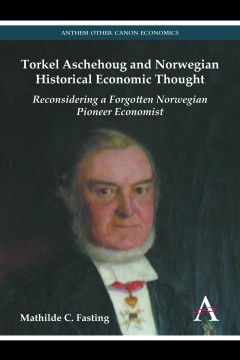Torkel Aschehoug and Norwegian Historical Economic Thought
Reconsidering a Forgotten Norwegian Pioneer Economist
By Mathilde C. Fasting
- About This Book
- Reviews
- Author Information
- Series
- Table of Contents
- Links
- Podcasts
About This Book
The historical schools of economics have been neglected within the arena of economic theory since the Second World War in favour of the now-dominant classical and neoclassical schools of economic thought. ‘Torkel Aschehoug and Norwegian Economic Thought’ offers a revaluation of the historical-empirical approach to economics that the Norwegian legal theorist and politician Aschehoug became renowned for during the last decades of the nineteenth century up to his death in 1909.
Fasting approaches Aschehoug’s economic thought in relation to his Norwegian colleagues, as well as the dominant international economists of the time. This comparison shows a theoretical affiliation with Gustav von Schmoller, in particular, through Aschehoug’s major work ‘Socialøkonomik’, as well as British economist Alfred Marshall’s marginal theory.
Fasting blends a historical account of the dominant economic models of the late 1800s with a review of contemporary theory through recent economic crises. This work argues that Aschehoug’s ‘Socialøkonomik’ is strikingly relevant to a present-day readership, revealing itself as a work which offers real insight into the reasons for economic collapse.
Reviews
‘Mathilde C. Fasting’s book is a fascinating and highly readable account of the most influential economist in Norwegian intellectual life in the late nineteenth century. Fasting carefully traces and analyses the intellectual impulses behind Aschehoug’s thinking, making this book a valuable contribution.’ —Professor Einar Lie, University of Oslo
‘With his historical approach to economics, Torkel Aschehoug was a Norwegian pioneer. Today’s interest in connecting economics to a broader understanding of society makes Fasting’s revitalizing study timely indeed.’ —Professor Rune Slagstad, Oslo University College
‘The historical school has received scandalously insufficient attention, even by historians of economic thought. Fasting has done a superb job in bringing the ideas of Torkel Aschehoug to an English-language audience.’ —Professor Geoff Hodgson, University of Hertfordshire
‘This book should be compulsory reading for historians of economic thought who want to understand the intellectual background for the development of economics in Norway in the nineteenth and the beginning of the twentieth century.’ —Professor Arild Sæther, University of Agder
Author Information
Mathilde C. Fasting has just finished her doctorate in political science at the University of Erfurt, Germany.
Series
Anthem Other Canon Economics
Table of Contents
Acknowledgements; Chapter 1: Introduction; Chapter 2: Biography; Chapter 3: Norwegian Economic and Political Context in the Nineteenth Century; Chapter 4: Norwegian Economic Thought and Method; Chapter 5: Development of the Economic Thought of Aschehoug: Statsøkonomisk Forening and the ‘Socialøkonomik’ Project; Chapter 6: The German Historical School: Similarities, Influences and Discrepancies; Chapter 7: Alfred Marshall: Aschehoug and the Adoption of Marginal Theory; Chapter 8: The French Influence: Adopting Say and Refuting Socialism; Chapter 9: Views of Labour in the Work of Aschehoug; Chapter 10: The Entrepreneur: The Fourth Production Factor; Chapter 11: Trade and Customs Debates from 1840 to 1906 165;Chapter 12: The Theory of Economic Crises; Chapter 13: The Legacy of Aschehoug: Concluding Remarks; Appendix A: Other Norwegian Turn-of-the-Century Economists; Appendix B: Drafts for ‘Socialøkonomik’; Appendix C: Detailed Contents of ‘Socialøkonomik’ (First Editions from 1903 to 1908); Notes; Literature; Index
Links
Stay Updated
Information
Latest Tweets



